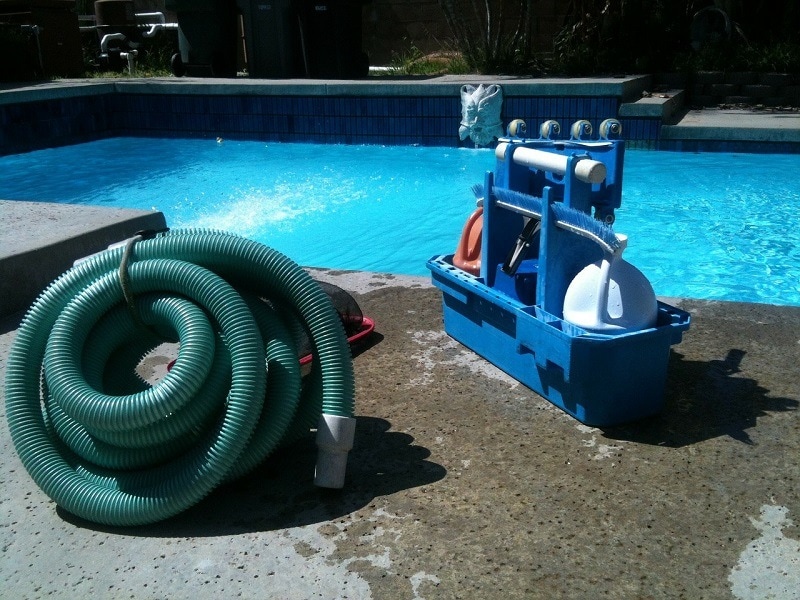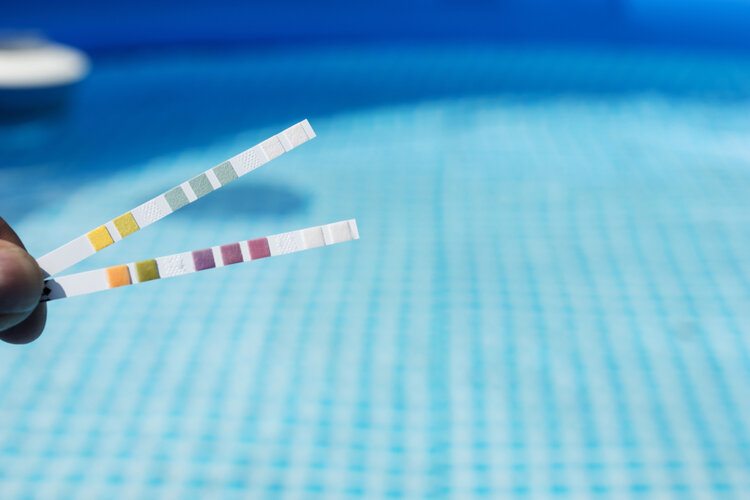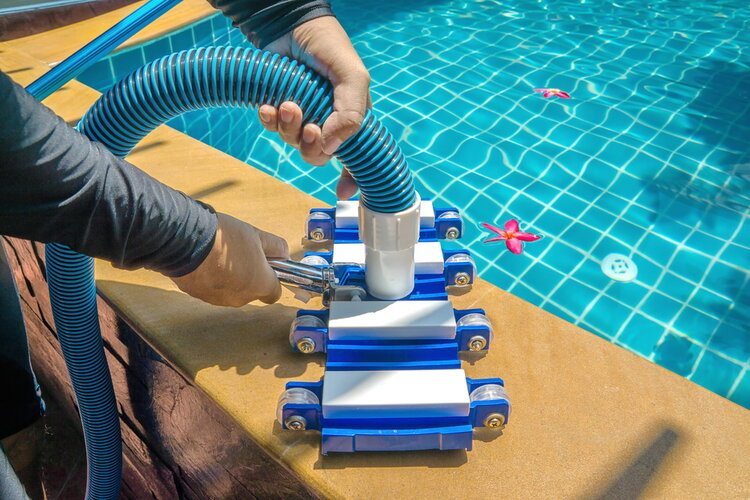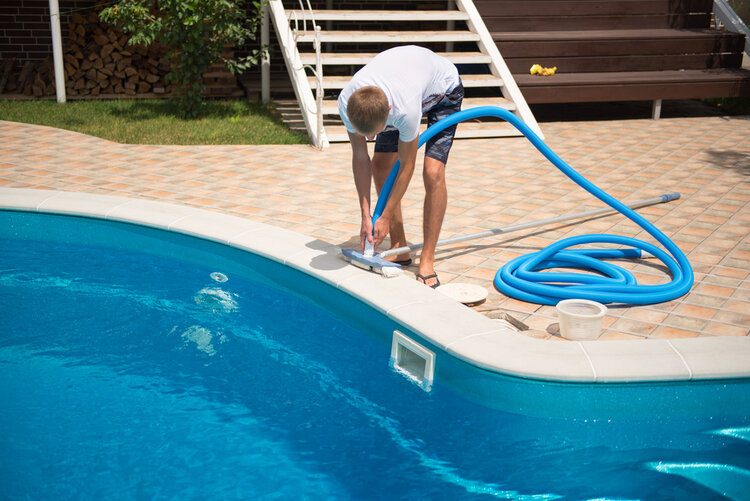How to Maintain Your Inground Pool
-
Pete Ortiz
- Last updated:

You will not learn how to maintain your inground pool in one day. Most seasoned pool owners will tell you that it took them months, even years, to get things dialed in. The conditions with which you are dealing are going to be constantly changing. There will be rainstorms, hot weather, cold fronts, pool parties, a random algae breakout. It just takes time to get the experience needed to keep the pool looking good continually.
We are going to break down the things you should be doing daily, weekly, and monthly when it comes to maintaining your inground pool. Maybe this is new to you, perhaps you keep coming across issues, and you realize you may be missing some necessary steps. Regardless of your situation, this information should provide you with the essential things needed to keep you in that pool as much as possible.
Daily

Don’t be scared by the idea of daily pool maintenance. This type of maintenance should take just a few minutes as long as you stay on top of it.
First, you are going to want to do a general look over your pool every day. Is the filter on? Does the pump seem to be working fine? Any warnings popping up? How is the water level of the pool? Make sure nothing is floating in the water, and nothing is on the bottom of the pool. This is just a general overview of the pool. If you happen to have a frog floating, you are going to want that out as soon as possible. If the circuit breaker to the pool pump flipped, you don’t want to miss an entire day without that running.
Secondly, you are going to want to check the chlorine and pH levels. This does not need to be done every single day, but it should be done every few days. Getting a simple at-home test kit is all you need to get this done. However, there are more advanced options that you can leave in your pool and have water conditions sent directly to an app on your phone.
As a general rule of thumb, keep your pH between 7.4-7.6 and keep your chlorine between 1 and 3 parts per million (ppm).
These numbers will vary from time to time, but staying within range will help prevent continual issues with your pool. The timing of your water checks needs to be considered, as well. Make sure not to test the water just after a rainstorm or directly after a heavy swim load. Give the pool some time to settle down. Try to check the water towards the end of the day.
Every day or so, the skimmer baskets should be emptied. If your pool is in an area with many trees and is subject to a large amount of debris, you may need to empty the skimmer. When you skip this step, the pool will no longer be able to clean itself properly, and you will be left doing a lot more manual skimming. It may take a few minutes a day, but it’s a lot quicker than manually removing it all the time.
Keep your pool pump running as much as you possibly can. You are ideally keeping it running twenty-four-seven if you can afford it. Variable-speed pool pumps will help to keep costs down and allow you to run the filter more often. Single-speed pool pumps will cost quite a bit to keep running all day. In the summer, try to keep the pool pump running at least 8-10 hours per day.
Weekly

Weekly pool maintenance will be your basic cleaning. Each week you are going to want to block off some time to test pH and chlorine and clean the pool as well. Necessary cleaning steps will involve skimming, vacuuming, and brushing the sides. Don’t try and vacuum the pool while people are using it. It is best to try and vacuum in the morning. At this point, all the dirt will have settled on the bottom of the pool. If you have an automatic pool vacuum that is even better, you can set it and forget it!
Brushing the sides of the pool is a step that people like to skip. It isn’t enjoyable, and it can take a bit of time, especially in a larger pool. The reason brushing is so important is that it helps prevent the growth of algae on the sides. Use a telescopic pole to make sure you can reach the bottom of the pool as well.
During the busy high-season summer months, it’s a good idea to shock your pool once per week. Many pool owners make the mistake of waiting until there is a problem with their pool to shock it. Shock can stop the issue before it gets out of hand. Always shock your pool in the early evening and keep the pool pump running through the night. If you shock your pool in the middle of the day, the sun will burn off the shock before it has the chance to work. Some homeowners have had success with shocking the pool on Sunday nights. After a long weekend of swimming, it can be perfect for cleaning everything up.
If you use preventative chemicals (which you should), like an algaecide or a clarifier, be sure to add the proper amount to the pool each week.
Depending on what type of pool filter you have, you may also need to do a backwash and a filter clean. Check with the manufacturer’s recommendations on your particular model to make sure that you are taking care of your pool as well as your equipment.
Take a look at your pool equipment and make sure that you have no leaks or cracks in any of the equipment. Sometimes you can catch an issue before things get to the point of total replacement.
Monthly

In addition to the weekly and daily checks, there are a few things that should be done once a month as well. Depending on what type of pool you have, buy a tile or vinyl cleaner and do a scrub of the walls of the pool. The more often you do this, the easier it will get, let it sit all season, and it won’t be very easy when you go to shut the pool down for the winter.
Do a thorough check of all chemicals: chlorine, pH, alkalinity, metals, etc.
Another thing that people sometimes forget is to clean the area around your pool. Depending on the surface you are dealing with, it can be beneficial to spray some bleach/water solution or a deck cleaner. This will help the pool stay clean as well when the area around it is also clean.
While you are at it, you may as well rinse down and wash all of the kid’s pool toys as well. Keeping algae from growing on anything will help the summer be much more successful.
This is an essential list of all the things that you should be paying attention to throughout the season. During the off-season, your list won’t be nearly as extensive, but some things are worth paying attention to.
Off-Season Pool Maintenance
When the pool is shut down for the winter, it can be a great time to get a few off-season projects taken care of. Here is a list of some ideas to work on when you can’t be in the pool anyway.
- Make sure that everything that you disconnected and put away for the winter is completely dry. Not only do you risk freeze damage on equipment that is not completely dry, but it can also grow moldy and create significant problems in the spring.
- Check your pools safety cover regularly. Do not let water accumulate on the cover. If water does start to become a problem, make sure to get a small pump to help you get the water off the cover.
- Try to keep leaves and other material off the cover as well. When you open in the spring, the last thing you want is a massive pile of junk all over the pool filter.
- Use a product that will help you maintain the chemical levels in the pool all winter long. Something like a winter pill will keep the chemicals dispersing during the winter, so you don’t open up to a mess. If you can get to the water and want to test it a few times throughout the winter, this is a great idea. Keep in mind when using something like a winter pill, you must make sure that it is the right size for your pool.
Conclusion
Pool maintenance is not something that anybody jumps out of bed to do. When you calculate the costs of having a professional do it or doing it all yourself, you will most likely find out that it pays to learn this process. Don’t be hard on yourself if you have issues in your first year or two. It takes time and energy to learn how to maintain a pool properly.
Keeping a close eye on your pool is more than half the battle.
Featured Image Credit: Pxfuel
Contents


